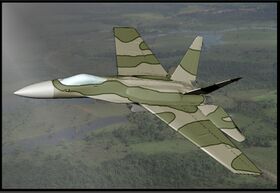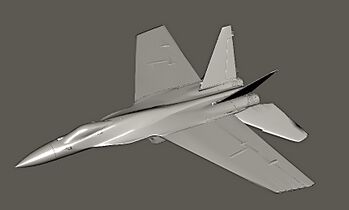Amérifighter EF-20: Difference between revisions
ContraViper (talk | contribs) |
ContraViper (talk | contribs) |
||
| Line 43: | Line 43: | ||
==Variants== | ==Variants== | ||
[[File:EF-20 noCFT.jpg| | [[File:EF-20 noCFT.jpg|x210px|thumb|left|3D Mockup of an EF-20C1]] | ||
===Standard Variants=== | ===Standard Variants=== | ||
'''EF-20A''' Standard, 1-seat variant <br /> | '''EF-20A''' Standard, 1-seat variant <br /> | ||
| Line 53: | Line 53: | ||
'''EF-20S1:''' Naval variant with folding wings and tail hook. Single seat.<br /> | '''EF-20S1:''' Naval variant with folding wings and tail hook. Single seat.<br /> | ||
'''EF-20S2:''' Naval variant with two-seats.<br /> | '''EF-20S2:''' Naval variant with two-seats.<br /> | ||
'''EF-20S-C1:''' Naval single-seat variant without conformal fuel tanks. | '''EF-20S-C1:''' Naval single-seat variant without conformal fuel tanks.<br /> | ||
===Other=== | ===Other=== | ||
Revision as of 14:48, 6 February 2022
| Amérifighter EF-20 Cascabel | |
|---|---|
 AC/A-20 in Inyurstan Jungle/Grassland camo | |
| General information | |
| Type | Heavy Strike Fighter |
| Manufacturer | |
| Status | In service |
| History | |
| Manufactured | 2001-present |
| Introduction date | 2003 |
The Amérifighter EF-20 Cascabel, also called the "AC/A-20 Crotaléa" in Inyursta, or "Diamondback" in the Organized States is a heavy strike fighter developed primarily by Inyursta and Gran Cuscatlan. It is intended to serve as both a deep-strike penetrator and capable air-to-air combatant.
Development
Research and development on the EF-20 began after the lighter air-superiority fighter the AC-88 Taipan had already entered service with the Inyurstan Air Force. Like the F-15, the AC-88 was designed with complete air-to-air combat in mind, and followed the logic of "not a pound for air-to-ground". Inyurstan military designers began conceptualizing a heavy strike strike fighter based on the Taipan.
In 1998, Cuscatlani officials were brought in on the project as well, seeking a replacement for their own EF-18 multirole fighters. Industrias Sobberias designed and provided the multi-purpose MATADOR radar for the aircraft. They also proposed the idea of making the aircraft an export fighter.
Design
The EF-20 uses the same main body as the AC-88, including domestically produced copies of the Nihonese Kojima K50 engines; however supercruise has not been tested nor is it advised due to the heavier airframe. Modified features of the EF-20 include increased wing loading space, removal of forward canards and the addition of conformational fuel tanks.
The Cuscatlani MATADOR radar is a multimode Passive Electronically Scanned Array (PESA) capable of detecting 3m2 airborne targets at around 280km in a 45o search arc with the capability to adjust beam/search arc width. It is also equipped with the CAT EYE infra-red search & track (IRST).
Both SEAD and self-defense capabilities are provided by the Sevât-M Counter-Emissions System capable of identifying, locating and targeting enemy emissions sources at long distances; as well as integration and automatic control of the LIDACS-III Counter-Measure Suite.
Variants
Standard Variants
EF-20A Standard, 1-seat variant
EF-20B Two-seat variant
EF-20C1: Single-seat variant without conformal fuel tanks for increased aerodynamics.
EF-20C2: Two-seat variant without conformal fuel tanks.
Carrier-Capable
EF-20S1: Naval variant with folding wings and tail hook. Single seat.
EF-20S2: Naval variant with two-seats.
EF-20S-C1: Naval single-seat variant without conformal fuel tanks.
Other
EE-20E2: Two-seat EW variant
EX-20 PEO: (Plata D'Ordinance Éxperímental) Used by Inyursta for air-launched weapons testing.
Specifications
Crew: 1-2
Speed: Mach 2.25 (mph; km/h)
Combat Radius: 1,285km
Range: >3,000km
Payload: 16,000lb (1,600kg)
Hardpoints:
- x3 Undercarriage
- x8 Underwing
Armament:
Air-to-Air
- AIM-120 AMRAAM
- AIM-9 Sabre SRAAM
- C-120 Rapier
- C-170 Rapier II
- C-80 Stilétto
- C-12 Éscouta
- Python Family
- SJJ-9 Kouwayzar
- SJJ-10 Muthnib
- SJJ-11 Saiha
- MAA-1
Air-to-Ground
- ASM-7 STRIKE
- AGM-65 Maverick
- AGM-84H/K SLAM-ER
- AGM-154 JSOW
- AGM-158 JASSM
- AGM-130
- CBU-S Torencón
- CB Bomb Family
- KZ Rocket Family
Anti-Radiation
Anti-Ship
- LRASM
- YU-7 Evening Tide
- AGM-84 Harpoon
- ASM-4 Leviathan
- ASM-8 Barracuda
